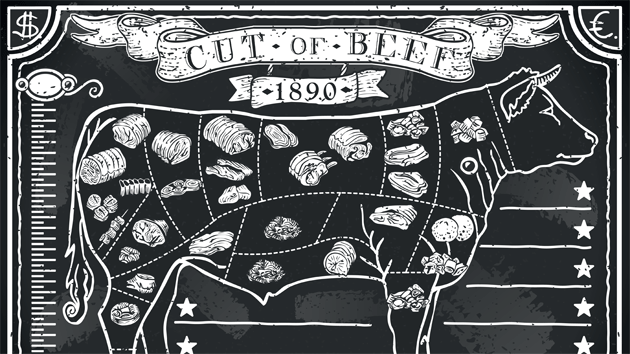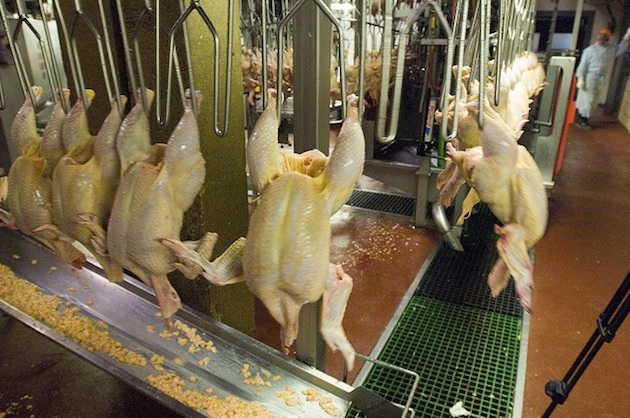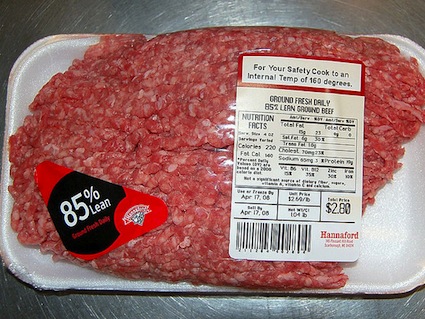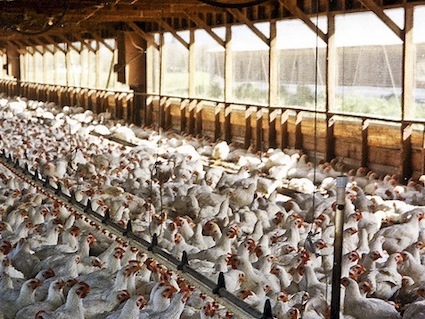
aurin/ThinkStock
Last month, Rancho Feeding Corp., a slaughterhouse in Petaluma, California, issued a small recall notice, for beef it had processed on a particular day in 2013. That much was routine—meat processing facilities have to pull back product with some regularity when contamination is discovered. But the Rancho recall was different: Earlier this month, the company announced that it needed to recall all the beef it processed in 2013—8.7 million pounds in all, found in more than a thousand grocery stores in 30 states. The most famous of the recalled items are Nestlé Hot Pockets, but the plant produced a lot of other beef products for wholesale, including cheeks, lips, liver, oxtail, and other parts. So have you eaten any of that beef? Here’s some background:
What is Rancho Feeding Corp.? Before it ceased operations last week, Rancho Feeding Corp. was the only USDA-approved slaughterhouse within about a three-hour radius of Petaluma. According to Stephanie Larson, the livestock and range adviser at the University of California’s Cooperative Extension system, about 25 percent of Rancho’s customers were “niche market” operations—many of which raised grass-fed and organic beef. The other 75 percent of the company’s business was meat destined for burgers, tacos, chili, and other processed foods for supermarkets and restaurants. Many of Rancho’s clients were dairies seeking to slaughter cows that were no longer giving milk.
Just how much meat is 8.7 million pounds? A few years back, my colleague Tom Philpott calculated that Cargill’s 36 million pounds of recalled ground turkey was enough to make burgers for the residents of the world’s six most populous cities. By the same logic, the 8.7 million pounds of Rancho recalled beef could make burgers for every resident of New York City, London, and Tokyo. As Gwynn Guilford at Quartz points out, letting that much potentially dodgy meat slip through the cracks is what happens when the government skimps on inspectors.
Why did they recall it? According to the USDA’ s Food Safety and Inspection Service, Rancho issued the recall after FSIS inspectors determined that it had “processed diseased and unsound animals and carried out these activities without the benefit or full benefit of federal inspection.” It was a Class I recall, which means the FSIS considered it “a health hazard situation where there is a reasonable probability that the use of the product will cause serious, adverse health consequences or death.” Beyond the recall notice, though, FSIS has offered few details. So far, there are no reports of people getting sick after eating tainted beef processed by Rancho.
How does the recall affect ranchers? Yesterday, the Los Angeles Times reported that Marin Sun Farms, an artisanal meat producer in Point Reyes Station, California, has bought Rancho Feeding Corp. If the company reopens the facility as a USDA-approved slaughterhouse, Rancho’s former clients will likely be relieved, since Rancho was the only game in town. (Consolidation of slaughterhouses is a problem for ranchers across the nation.)
Bill Niman, the founder of sustainable meat company Niman Ranch who now runs a grass-fed operation called BN Ranch, told the Village Voice that Rancho’s closing would be “a great loss to the Northern California food community.”
Sally Gale and her husband own Chileno Valley Ranch, a 600-acre, 100-head beef operation in Marin County that sells grass-fed beef directly to consumers. The Gales, who have owned their ranch for 15 years, used to hire a slaughterer to dispatch their steers on their property. (A few years ago, Bonne Azab Powell profiled a traveling slaughterer in Mother Jones.) But about five years ago, they received a notice saying that the practice was illegal and that they must take their animals to a USDA-certified slaughterhouse. The only one in the area was Rancho.
Because of the recall, the Gales have had to dispose of three adult steers—worth about $1,600 each—that Rancho had slaughtered. If Rancho closes, Sally Gale worries that the long drive to the next closest slaughterhouse, more than 150 miles away, will stress the animals and add an extra expense to what Gale describes as an “already marginal business.” California’s drought has hit ranches like hers hard, she says, and she expects that many will have to charge their customers more to make up for the losses.
Typically, Chileno Valley Ranch sends about six cows to slaughter every week. Now, the Gales will be waiting until they have 30 ready to make the long trip worthwhile. “The government told us that we couldn’t slaughter our own meat,” says Gale. “And now they’re telling us that we can’t bring them to Rancho either.”
















